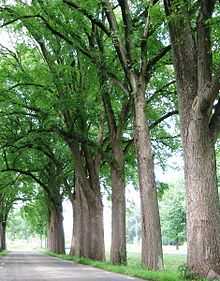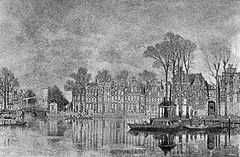Ulmus × hollandica 'Belgica'
| Ulmus × hollandica | |
|---|---|
 Belgian Elms in the Netherlands. Photo: Ronnie Nijboer | |
| Hybrid parentage | U. glabra × U. minor |
| Cultivar | 'Belgica' |
| Origin | Belgium |
The Belgian Elm Ulmus × hollandica 'Belgica' became popular throughout Belgium and the Netherlands in the 19th century, both as an ornamental and as a shelter-belt tree. [1] [2] It was the 'Hollandse iep' (:'Dutch elm') in these countries, as distinct from the tree known as 'Dutch Elm' in Great Britain and Ireland since the 17th century: Ulmus × hollandica 'Major'.[2]
Description
'Belgica' has a broad crown supported by a straight, rough-barked stem. Unusually thriving on poor sandy soils, it proved one of the fastest-growing elms in Europe, typically achieving heights of < 40 m. The obovate to elliptic leaves are < 12 cm long by 5 cm wide, and terminate at the apex as a long, serrated point. 'Belgica' was prized, among other reasons, for its "ease and grace of twigs and foliage".[3]
Pests and diseases
Very susceptible to Dutch elm disease, it was the loss of this particular elm more than any other to the earlier strain of the disease which initiated the Dutch elm breeding programme in 1928.[4] 'Belgica' is also very vulnerable to verticillium wilt.[5]
Cultivation
Reputedly raised in the nurseries of the Abbey of the Dunes (Abdij Ten Duinen), Veurne, (later removed to Bruges) [6] 'Belgica' was planted in great numbers along roads, streets and canals,[7] and also in squares, parks and gardens.[8] Its popularity and its aesthetic qualities are evidenced in photographic records of the Netherlands from the late 19th century to c.1920.[9][10] 'Belgica's "rapid growth even on poor soils and its good resistance to wind and atmospheric pollution"[11] made it an ideal choice for shelter-belt planting.
The cultivar has been introduced to arboreta in North America (see under Accessions), but there is no record of its introduction to Australasia.
Notable trees
The Oudemanhuispoort 'Belgica' in Amsterdam, planted in 1895, is the largest elm in the Netherlands, with a height of 34.6 m and a girth of 4.4 m.[12] The UK TROBI champion tree grows at Dyke Park Road in Brighton, measuring 17 m high by 92 cm d.b.h. in 2009, one of nine trees forming part of the NCCPG Collection (see under Accessions).
A large tree identified as 'Belgian Elm' was photographed at the Ellwanger and Barry nursery at Mount Hope, Rochester, New York, circa 1900. However, the photograph is also endorsed 'Superba', although the tree, with its broad crown, more closely resembles 'Belgica'.
'Belgica' in art

The column-like boles, high-arching branches and graceful foliage of 'Belgica' elms ('Hollandse iepen') beside canals and streets in the Netherlands are celebrated in many of the paintings and drawings of the Dutch artist Karel Klinkenberg (1852-1924).[13]
Synonymy
- Ulmus batavina: Koch, Dendr. 2 (1): 414 1872).
- Ulmus belgica: Weston, Fl. Angl. 46. 1775.
- Ulmus campestris (: minor) bataviana: Simon-Louis, (Metz, France, Catalogue, 1869.
- Ulmus montana (: glabra) var. belgica
- Ulmus × hollandica var. belgica
Hybrid cultivars
- 'Den Haag' (Ulmus pumila × Ulmus × hollandica 'Belgica'), raised in Holland in 1936.
Accessions
- North America
- Arnold Arboretum. Acc. no. 322-81
- Longwood Gardens. Acc. no. 1967-0877
- Morton Arboretum. Acc. no. 1457-24
- Europe
- Brighton & Hove City Council, UK, NCCPG Elm Collection . Examples planted at Dudeney Lodge, Dyke Road Park and Donald Hall Road
Nurseries
- Noordplant , Glimmen, The Netherlands.
References
- ↑ Elwes, H. J. & Henry, A. (1913). The Trees of Great Britain & Ireland. Vol. VII. 1848–1929. Republished 2004 Cambridge University Press, ISBN 9781108069380
- ↑ 2.0 2.1 Richens, R. H., Elm, Cambridge 1983
- ↑ Heybroek, H. M., 'Resistant Elms for Europe' (1982) in Research on Dutch Elm Disease in Europe, HMSO, London 1983
- ↑ Heybroek, H. M. (1993). The Dutch Elm Breeding Program. In Sticklen & Sherald (Eds.)(1993). Dutch Elm Disease Research, Chapter 3. Springer Verlag, New York, USA
- ↑ Pegg, G. F. & Brady, B. L. (2002). Verticillium Wilts. CABI Publishing. ISBN 0-85199-529-2
- ↑ Meulemans, M., and Parmentier, C., give its date of introduction as 1694 ('Studies on Ceratocystis ulmi in Belgium' in Research on Dutch Elm Disease in Europe, HMSO, London 1983)
- ↑ Photographs of Ulmus x hollandica 'Belgica' in Amsterdam and rural Holland
- ↑ Hilliers' Manual of Trees & Shrubs. (1977). David & Charles, Newton Abbot, UK
- ↑ La Hollande illustrée, Librairie Larousse, Paris 1908
- ↑ www.bontehoek.nl
- ↑ Bean, W. J. (1988) Trees and shrubs hardy in Great Britain, 8th edition, Murray, London; p.647
- ↑ The Oudemanhuispoort elm in Amsterdam (photographs 8 and 9) ; photograph of columnar bole of the Oudemanhuispoort elm (to right of entrance)
- ↑ Johannes Christiaan Karel Klinkenberg